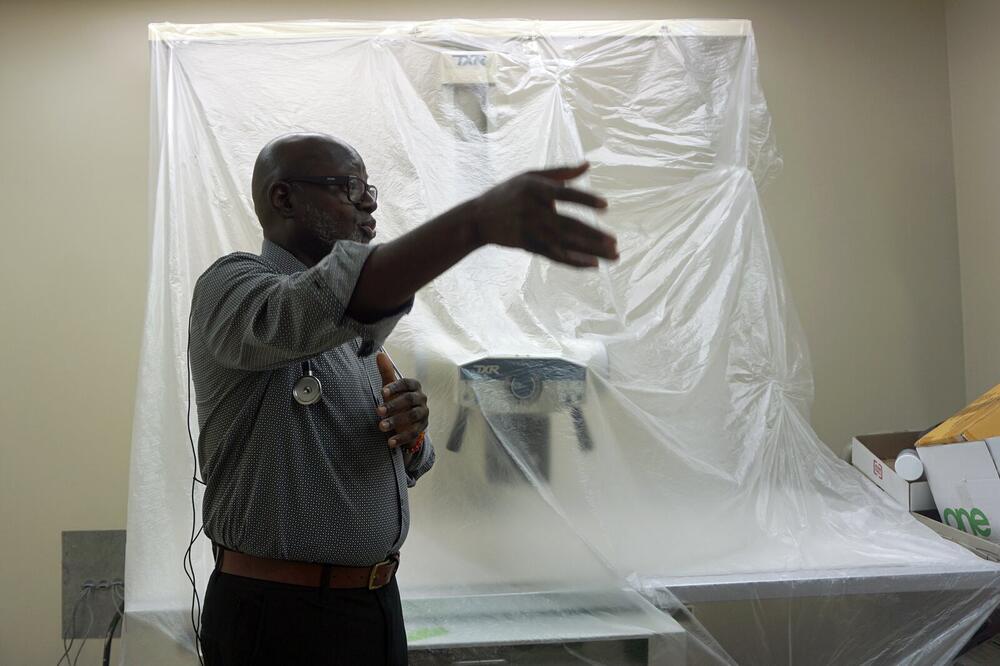
Caption
Dr. Alawode Oladele in front of a new X-ray machine that is part of DeKalb Public Health's new tuberculosis clinic. The county has the highest rate of TB infections among Georgia counties.
Credit: Rebecca Grapevine / Healthbeat

Dr. Alawode Oladele in front of a new X-ray machine that is part of DeKalb Public Health's new tuberculosis clinic. The county has the highest rate of TB infections among Georgia counties.
DeKalb County has the highest rate of tuberculosis cases in Georgia. Next week, it’s opening a new clinic to help test for the disease and treat it.
The clinic at the county’s Richardson Health Center on Winn Way is in a renovated space on the ground floor. It features eight treatment rooms, along with a separate entrance and negative pressure technology to prevent the spread of the contagious bacterial infection. A new radiology suite has a digital imaging system for X-rays.
Last year, DeKalb reported 52 cases of TB, while neighboring Gwinnett and Fulton reported 35 and 26 respectively, according to a surveillance report from the state Department of Public Health.
Part of the reason for DeKalb’s high rate of TB is the demographic make-up of the county, said Dr. Alawode Oladele, the supervising physician and laboratory director for infectious diseases and refugee health at DeKalb Public Health.
“It has to do with the diversity of the county and the fact that a lot of folks who are here, who are not U.S. born, come from what we call high TB-burden countries,” Oladele said, referring to nations with high TB rates.
People who were born abroad make up about 73% of the county’s TB cases, he said. Most came from Mexico, India, Guatemala, or Vietnam, according to the state DPH’s 2023 surveillance report.
Refugees and immigrants are typically screened for TB before they enter the United States. Oladele said most of DeKalb’s cases are in undocumented migrants or immigrants who have been here for awhile from high-burden countries.
The other 27% of DeKalb’s cases come from people born in the United States, Oladele said, affecting people from all walks of life.
Oladele has spent the past 28 years working on TB in DeKalb. He was born in Nigeria and came to Atlanta to study medicine at Morehouse School of Medicine and Emory University.
“I would watch people die from TB [in Nigeria], and it’s sad, because we have the capacity to prevent those deaths, right? But we didn’t have access,” Oladele said.
He sees his work in DeKalb as “an opportunity to do global work on a local level,” noting that the World Health Organization last year deemed TB the top infectious cause of death in the world, with about 1.25 million deaths in 2023.
Oladele said treating TB and stopping its spread is very resource intensive. In some cases, staff members must supervise patients taking their drugs daily, typically for four to six months. Contact tracing can be complicated, especially among undocumented communities and those who lack trust in the government and medical workers.
DeKalb County funded the new clinic, but recent cuts to public health funding have introduced new constraints. Oladele said 17 of the more than 20 people who worked on TB contact tracing and ensuring people took their medications in DeKalb were recently let go by the state after the federal government “clawed back” Covid relief funding to state health departments.
“Without the funding, without the resources, we’re handcuffed, and it limits our ability to do the work,” Oladele said.
Global funding for tuberculosis prevention and treatment decreased in 2023 and “remains far below target,” according to the WHO.
The U.S. Agency for International Development, the country’s main foreign aid agency, until this year led global TB eradication efforts. But the Trump administration has dissolved USAID.
President Donald Trump’s proposed budget for next year would, if approved, decrease support for global TB work from this year’s $406 million to $228 million.
“It’s been amply demonstrated that investments by the U.S. government in strengthening global TB prevention and control have direct benefit to our country,” said Carmen Marsit, a professor at Emory University’s School of Public Health. “It is really crucial that, just as diseases know no borders, our efforts don’t stop at our border.”
While tuberculosis numbers were on the way down prior to Covid, cases have since ticked back up, globally, nationally, and in DeKalb, Oladele said.
The Centers for Disease Control and Prevention reported that national tuberculosis rates increased three years in a row, from 2020 to 2023.
TB is an infectious bacterial disease that primarily affects the lungs but can infect other parts of the body. The bacteria can stay in a person’s body for years or even decades without making them sick or being transmissible to other people, in what is called latent TB.
But if a person’s immune system can no longer control the infection, latent TB can develop into active TB, which can lead to sickness or even death, especially if left untreated. TB germs can spread through the air when a person with active TB coughs, speaks, or sings. In comparison to highly transmissible diseases like measles, TB typically requires prolonged, close contact to spread.

DeKalb Public Health's new tuberculosis clinic includes negative air pressure technology to prevent the spread of the bacterial disease.
In the United States, those at higher risk of disease exposure include people who live in certain congregate settings like homeless shelters or prisons, as well as people traveling from countries where TB is common, according to the CDC. People at risk of developing the disease, if infected, include those with immune systems that are weakened due to medications, or conditions like cancer or HIV/AIDS.
In its primary stage, TB manifests with flu-like symptoms, like a low fever, tiredness and cough. Active TB disease can result in coughing up blood or mucus, chest pain, fever, and chills, among other symptoms.
The disease is treated through the use of antibiotics, and a patient is typically required to take daily medications over many months.
Globally, rising numbers of drug-resistant TB complicate the work of controlling this disease. Drug-resistant TB doesn’t respond to common medications and requires more complex treatment. The WHO describes multidrug-resistant TB as a public health crisis, noting that worldwide, only about 2 in 5 people with drug-resistant TB accessed the treatment in 2023.
Rebecca Grapevine is a reporter covering public health in Atlanta for Healthbeat. Contact Rebecca at rgrapevine@healthbeat.org. This story comes to GPB through a reporting partnership with Healthbeat.
Georgia Health Initiative is a non-partisan, private foundation advancing innovative ideas to help improve the health of Georgians. Learn more at georgiahealthinitiative.org